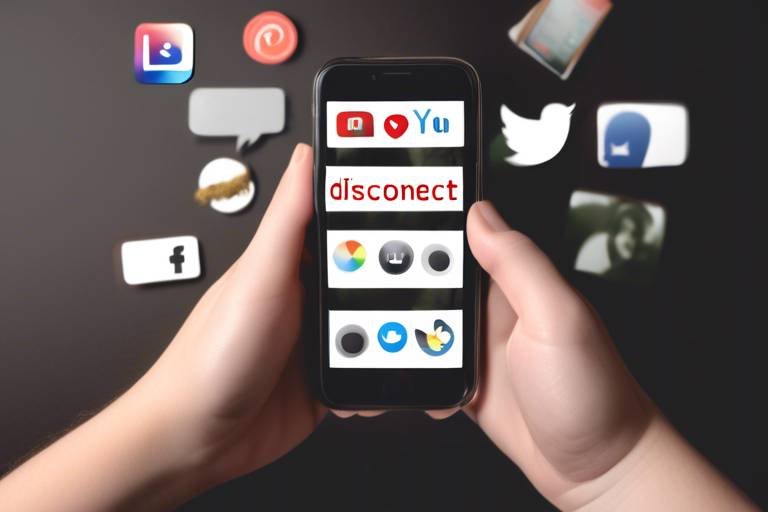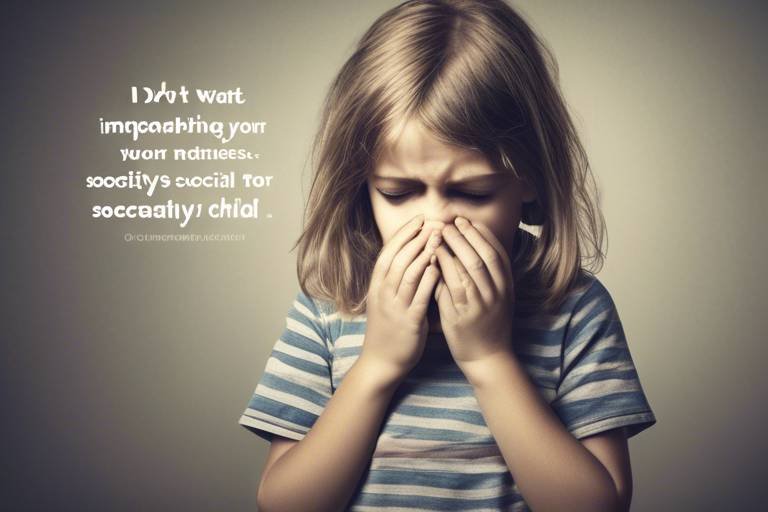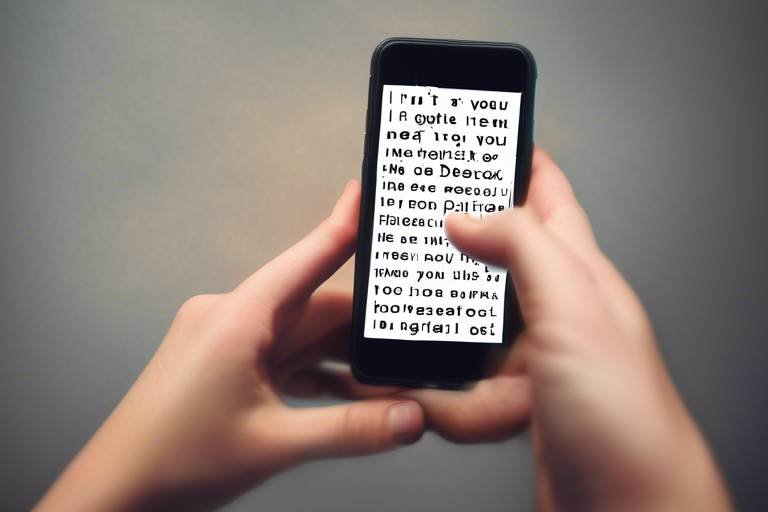Protecting Your Mental Health from Social Media FOMO
In today's hyper-connected world, social media has become an integral part of our lives. We scroll through countless posts, snapshots, and stories, often feeling an unsettling twinge of anxiety as we witness friends and acquaintances seemingly living their best lives. This phenomenon, commonly known as the Fear of Missing Out (FOMO), can have profound effects on our mental health, leading to feelings of inadequacy, loneliness, and even depression. Understanding the dynamics of FOMO is essential for anyone looking to safeguard their mental well-being in the digital age.
So, what exactly is FOMO? At its core, FOMO is the nagging feeling that others are enjoying experiences that you are not part of. It’s that pit in your stomach when you see friends posting about their weekend adventures while you're at home binge-watching your favorite series. This digital comparison can create a vicious cycle of envy and dissatisfaction, making it crucial to recognize and address these feelings before they spiral out of control.
As we dive deeper into the impact of social media on our mental health, it's important to acknowledge that FOMO isn't just a passing feeling; it can become a pervasive mindset. Studies have shown that individuals who frequently engage with social media are more likely to experience anxiety and depression. This is largely due to the constant barrage of curated content that often showcases only the highlights of life—what I like to call the “highlight reel”. It’s easy to forget that behind every perfect picture lies a reality that may not be as glamorous.
To combat FOMO effectively, we must first understand its roots. By identifying the triggers that lead to these feelings, we can take proactive steps to mitigate their effects. Often, social comparison is a major contributor. When we see others posting about their vacation in Bali or their new promotion, it’s hard not to feel a pang of jealousy or inadequacy. By recognizing that these posts are often just a snapshot of someone's life—often filtered and edited—we can begin to shift our perspective.
Moreover, peer pressure plays a significant role in intensifying FOMO. The expectation to conform to social norms depicted online can leave us feeling like we’re falling short. It’s crucial to remind ourselves that social media is a curated space, and what we see is not necessarily the full picture. By aligning our social media use with our personal values and priorities, we can create a more fulfilling online experience that doesn’t leave us feeling like we’re missing out.
To protect our mental health from the clutches of FOMO, we can implement several strategies. Mindfulness practices, for instance, encourage us to stay present and appreciate our own experiences rather than constantly comparing ourselves to others. Setting clear boundaries around social media use, such as limiting screen time or curating our feeds to include only positive influences, can also foster a healthier relationship with these platforms. By taking control of our social media habits, we can significantly reduce the impact of FOMO and enhance our overall well-being.
- What is FOMO?
FOMO, or Fear of Missing Out, is the anxiety that arises from the belief that others are having rewarding experiences that you are not a part of.
- How can I reduce FOMO?
Strategies include practicing mindfulness, setting boundaries around social media use, and focusing on your own values and priorities.
- Is FOMO harmful to mental health?
Yes, FOMO can lead to feelings of anxiety, depression, and dissatisfaction with one's own life.
- Can social media be beneficial for mental health?
While it can contribute to FOMO, social media can also foster connections and provide support if used mindfully.

Understanding FOMO and Its Effects
In today's hyper-connected world, the term FOMO, or the Fear of Missing Out, has become a common phrase that resonates with many of us. But what does it really mean? At its core, FOMO is that nagging feeling that arises when we believe others are experiencing something better than we are. This sensation can lead to a cascade of negative emotions, including anxiety, stress, and even dissatisfaction with our own lives. It's as if we're constantly scrolling through a highlight reel of everyone else's lives while feeling stuck in our own mundane routines.
The psychological implications of FOMO are profound. Research has shown that individuals who frequently experience FOMO are more likely to suffer from mental health issues such as depression and low self-esteem. This is largely due to the constant comparison we make with others, fueled by social media platforms that showcase curated images of happiness and success. When we see our friends traveling to exotic locations or enjoying glamorous parties, it's easy to feel left out, leading to a spiraling sense of inadequacy.
Moreover, FOMO can disrupt our ability to enjoy the present moment. Instead of savoring our own experiences, we may find ourselves distracted, wondering what others might be doing instead. This can create a cycle of discontent, where we are never fully satisfied with our current situation. It’s like trying to enjoy a delicious meal while constantly glancing at the table next to you, where a more extravagant feast is being served.
To better understand FOMO, it's essential to recognize its triggers. These can range from specific social media posts to particular events that we perceive as exclusive or exciting. For example, seeing friends post about a concert you weren't invited to can ignite feelings of jealousy and regret. By identifying these triggers, we can start to take control of our reactions and develop healthier social media habits.
In summary, FOMO is not just a fleeting feeling; it’s a pervasive emotional state that can significantly impact our mental health. By becoming aware of its effects and the factors that contribute to it, we can begin to navigate our social media experiences more mindfully. Remember, the next time you feel that familiar pang of FOMO, you’re not alone—many others are feeling it too. The key is to recognize it, understand it, and take steps to mitigate its impact on our lives.

Identifying Triggers of FOMO
In our hyper-connected world, identifying the triggers of Fear of Missing Out (FOMO) is essential for anyone looking to safeguard their mental health. FOMO is not just a fleeting emotion; it can manifest as a persistent feeling that others are experiencing more fulfilling lives, leading to anxiety and dissatisfaction. By understanding what specifically ignites these feelings, individuals can take proactive steps to mitigate their impact.
One of the primary triggers of FOMO is social comparison. Social media platforms provide a constant stream of curated content where users often showcase their best moments. It's easy to fall into the trap of comparing your everyday life to someone else's highlight reel. This can lead to feelings of inadequacy, as you might think, "Why am I not doing something as exciting as that?" This unhealthy comparison can significantly affect your self-esteem and overall satisfaction with life.
When scrolling through your feed, you might notice that your friends are on vacation, attending exclusive events, or achieving significant milestones. This constant barrage of idealized images can create a sense of urgency to keep up, further fueling FOMO. It's crucial to recognize that these portrayals are often filtered and edited, presenting a distorted reality that doesn't reflect the true, messy nature of life.
Moreover, the phenomenon of highlight reels versus reality is a significant contributor to FOMO. Users often share only the best parts of their lives, leading to an unrealistic perception of what life should look like. Understanding that everyone has struggles and challenges can help you maintain perspective. Remember, behind every perfect photo is a story that may not be as glamorous as it seems. This recognition can be liberating, allowing you to appreciate your journey without the pressure to conform to someone else's narrative.
Another substantial trigger for FOMO is the peer pressure that comes from social media. The expectation to participate in trending activities or to be part of the latest social event can create a sense of urgency. If you see friends posting about a concert or a party you weren't invited to, it can feel like you're missing out on something essential. Understanding these social norms and pressures can help you navigate your experiences more effectively. It's essential to recognize that you don't have to engage in every trend or event to validate your worth or social standing.
Finally, aligning your social media habits with your personal values and priorities can significantly reduce the impact of FOMO. When you use social media intentionally and focus on what truly matters to you, the feelings of inadequacy and anxiety can diminish. Ask yourself, "Does this content align with my values?" If not, it might be time to curate your feed or even take a break from certain platforms.
In summary, identifying the triggers of FOMO is a vital step in managing its effects. By recognizing the role of social comparison, understanding the highlight reel phenomenon, and being aware of peer pressure, you can take control of your social media experience. This awareness empowers you to cultivate a healthier relationship with social media and prioritize your mental well-being.
- What is FOMO? FOMO stands for Fear of Missing Out, a feeling of anxiety that arises when one believes others are having rewarding experiences without them.
- How can I reduce FOMO? You can reduce FOMO by practicing mindfulness, setting boundaries around social media use, and focusing on your personal values.
- Is FOMO harmful to mental health? Yes, FOMO can lead to feelings of inadequacy, anxiety, and depression if not managed properly.
- Can social media be beneficial? While social media can trigger FOMO, it can also foster connections and provide support if used mindfully.

Social Comparison
Social media has revolutionized the way we connect and communicate, but it has also opened the floodgates to a phenomenon known as . This is when we find ourselves constantly measuring our lives against the highlight reels of others. Have you ever scrolled through your feed and felt a pang of envy as you see friends on exotic vacations, living their best lives? That feeling is more common than you might think, and it can lead to a cascade of negative emotions. The truth is, social media platforms are designed to showcase the best moments, creating a distorted reality that can leave us feeling inadequate or dissatisfied with our own lives.
When we compare ourselves to others, we often overlook the fact that we are only seeing a curated version of their experiences. For instance, while someone might post a picture of their luxurious dinner, they might not share the stress of their day or the struggles they faced to get there. This illusion of perfection can be a double-edged sword; while it may inspire us, it can also lead to feelings of failure when we feel we can't measure up. It's essential to recognize that what we see online is often just the surface, and beneath it lies a more complex reality.
Moreover, the impact of social comparison on our self-esteem can be profound. Research indicates that individuals who frequently engage in social comparison are more likely to experience feelings of anxiety and depression. This is particularly true for younger generations who have grown up in the age of social media. It’s like being caught in a never-ending race, where the finish line keeps moving further away. So how do we break free from this cycle?
One way to combat the negative effects of social comparison is by practicing self-compassion. Instead of judging ourselves harshly for not measuring up, we can learn to appreciate our unique journeys. Here are a few strategies to help shift our mindset:
- Limit your exposure: Curate your feed to include accounts that inspire you positively rather than make you feel inadequate.
- Focus on your achievements: Remind yourself of your accomplishments and the progress you've made in your own life.
- Practice gratitude: Regularly reflect on the things you are grateful for, which can help shift your focus from what others have to what you possess.
By understanding the dynamics of social comparison, we can take proactive steps to protect our mental health and foster a more positive online experience. It's not about eliminating social media entirely but rather about creating a healthier relationship with it. Remember, everyone has their battles, and the grass is not always greener on the other side.

Highlight Reels vs. Reality
In the world of social media, we often find ourselves scrolling through what can only be described as a never-ending stream of highlight reels. These are the carefully curated snapshots of life that people choose to share online, showcasing their best moments—think stunning vacation photos, extravagant celebrations, or perfectly plated meals. While it’s great to see friends and influencers enjoying life, it’s essential to recognize that these glimpses are often just that: glimpses. They represent a filtered reality, a version of life that is often far removed from the mundane or challenging moments that everyone experiences.
When we compare our everyday lives to these highlight reels, it’s easy to feel a sense of inadequacy. We might find ourselves asking questions like, “Why isn’t my life this exciting?” or “What am I doing wrong?” This kind of thinking can lead to a spiral of negative emotions, including anxiety and dissatisfaction. It’s crucial to remember that behind every stunning photo, there’s a whole story, often filled with ups and downs that aren’t visible in a single image.
To combat this unhealthy comparison, it’s helpful to adopt a more balanced perspective. Here are a few strategies to keep in mind:
- Seek Authenticity: Follow accounts that promote realness and vulnerability, sharing both highs and lows.
- Limit Exposure: Take breaks from social media or unfollow accounts that trigger feelings of inadequacy.
- Reflect on Your Own Life: Make a conscious effort to appreciate your own experiences, both big and small.
Ultimately, the key is to cultivate an awareness of the disparity between highlight reels and reality. By doing so, we can begin to appreciate our own lives more fully, recognizing that everyone has their own unique journey filled with both triumphs and tribulations. This shift in perspective can significantly reduce feelings of FOMO, allowing us to engage with social media in a healthier, more fulfilling way.
- What is FOMO?
FOMO, or the fear of missing out, is a psychological phenomenon where individuals feel anxious about missing out on rewarding experiences that others are having, often exacerbated by social media. - How can I reduce FOMO?
Strategies include practicing mindfulness, setting boundaries around social media use, and focusing on authentic connections rather than comparisons. - Is it normal to feel FOMO?
Yes, many people experience FOMO, especially in our digitally connected world. Recognizing it is the first step toward managing it.

Peer Pressure and Expectations
In today's digital landscape, peer pressure manifests in intricate ways, particularly through the lens of social media. The constant barrage of curated posts and stories can create an overwhelming sense of obligation to conform to what others are doing. Have you ever found yourself scrolling through your feed, feeling the weight of expectations to attend that trendy event or to showcase a picture-perfect lifestyle? This is the essence of peer pressure in the online world, where the desire to fit in can sometimes overshadow our own personal values and choices.
Social media platforms often amplify this pressure, pushing individuals to present themselves in ways that align with popular trends or the lifestyles of their peers. This need for validation can lead to a cycle of anxiety and dissatisfaction, as we constantly measure our worth against the highlight reels of others. It’s crucial to recognize that these platforms are often not a reflection of reality but rather a curated version of it. The pressure to keep up can lead to feelings of inadequacy and a sense of missing out on experiences that seem to be the norm for everyone else.
To navigate these challenges, it’s important to understand the implications of peer pressure and how it shapes our online interactions. Here are some key points to consider:
- Recognize the Illusion: Understand that what you see online is often a polished version of reality, not the full picture.
- Evaluate Your Values: Ask yourself if the pressure to conform aligns with your personal values and priorities.
- Limit Exposure: Consider curating your feed to include accounts that inspire positivity and authenticity, rather than those that evoke feelings of inadequacy.
By acknowledging the influence of peer pressure and expectations, individuals can take proactive steps to reclaim their online experience. It’s about finding a balance between engaging with social media and maintaining a healthy self-image. Remember, it’s okay to step back and prioritize your own mental health over the need to keep up with the crowd. In doing so, you can cultivate a more authentic and fulfilling online presence, free from the constraints of societal expectations.
Q1: How can I reduce feelings of FOMO when using social media?
A1: Consider setting time limits for your social media use and curating your feed to include accounts that promote positivity. Engaging in mindfulness practices can also help you stay present and appreciate your own experiences.
Q2: Is it normal to feel pressure from social media?
A2: Yes, it’s common to feel pressure due to social media. Many people experience the need to conform to perceived norms, which can lead to anxiety. Recognizing these feelings is the first step to managing them.
Q3: How can I align my social media use with my personal values?
A3: Reflect on what matters most to you and adjust your social media habits accordingly. Follow accounts that resonate with your values and actively engage in content that reflects your interests and priorities.

Personal Values and Priorities
In a world dominated by social media, aligning your online presence with your personal values and priorities is not just a luxury; it's a necessity. Have you ever scrolled through your feed and felt a pang of envy or inadequacy? This often stems from the disconnect between what we see online and what truly matters to us. By focusing on our core values, we can create a more meaningful and fulfilling social media experience. Think of it as navigating a ship; without a clear destination, you might drift aimlessly through stormy seas.
To start, it's essential to identify what truly resonates with you. Are you passionate about environmental issues, mental health awareness, or perhaps artistic expression? Once you pinpoint these values, you can curate your social media feeds to reflect them. Follow accounts that inspire you, engage with content that uplifts, and, most importantly, unfollow those that make you feel less than your best self. This conscious curation not only reduces feelings of FOMO but also fosters a sense of community around shared passions.
Moreover, aligning your online activities with your priorities can lead to a more balanced life. For example, if you value family time but find yourself constantly checking social media, it might be time to set some boundaries. Consider designating specific times during the day for social media use, allowing you to enjoy the present moment with loved ones without the distraction of notifications. This practice not only enhances your relationships but also reinforces your commitment to what truly matters.
Another effective strategy is to engage in intentional sharing. When you post, think about how your content reflects your values. Are you showcasing moments that bring you joy or sharing insights that could benefit others? This not only enriches your online presence but also creates a ripple effect, encouraging your followers to do the same. By cultivating a space that aligns with your values, you can transform your social media experience from one of anxiety to one of authenticity.
In summary, aligning your social media use with your personal values and priorities is a powerful antidote to the anxiety of FOMO. By consciously curating your online interactions, setting boundaries, and sharing authentically, you can reclaim your mental well-being and enjoy a more fulfilling digital experience. Remember, social media should serve you, not the other way around!
- What is FOMO? FOMO, or the fear of missing out, is the anxiety that arises from the belief that others are having more rewarding experiences than you are.
- How can I reduce feelings of FOMO? You can reduce FOMO by aligning your social media use with your personal values, setting boundaries, and practicing mindfulness.
- Is it necessary to unfollow people on social media? Yes, unfollowing accounts that make you feel inadequate can significantly improve your mental health and reduce FOMO.
- How can I engage more intentionally on social media? Share content that reflects your values, engage with uplifting posts, and focus on building a community that resonates with you.

Strategies to Combat FOMO
Feeling overwhelmed by the constant barrage of social media updates? You're not alone! The fear of missing out, or FOMO, can feel like a heavy weight on your shoulders, but there are effective strategies to help you combat it. By implementing these techniques, you can reclaim your peace of mind and build a healthier relationship with social media.
First and foremost, mindfulness practices can be a game-changer. Think of mindfulness as a mental reset button. Incorporating mindfulness into your daily routine allows you to stay present and appreciate the moment without worrying about what others are doing. Whether it's through meditation, deep-breathing exercises, or simply taking a moment to savor your morning coffee, these practices can reduce anxiety and help you appreciate your own life rather than comparing it to others'.
Another powerful strategy is setting boundaries around your social media use. It’s essential to establish clear limits to protect your mental health. Here are some boundary-setting tips:
- Time Limits: Decide how much time you want to spend on social media each day. Use apps that track your usage or set alarms to remind you when it's time to log off.
- Content Curation: Be selective about who you follow and what content you consume. Unfollow accounts that trigger feelings of inadequacy or anxiety, and seek out positive, uplifting content instead.
- Designated Times: Allocate specific times during the day for social media use. This helps create a routine and prevents aimless scrolling.
In addition to mindfulness and boundaries, aligning your social media use with your personal values can significantly reduce feelings of FOMO. Take a moment to reflect on what truly matters to you. Is it family, friends, hobbies, or personal growth? By focusing on these core values, you can curate your online experience to reflect what you genuinely care about. This alignment not only enhances your online interactions but also fosters a sense of fulfillment that can counteract the negative effects of FOMO.
Lastly, remember that it's okay to take a break! Sometimes, stepping away from social media for a few days can provide a fresh perspective. Use this time to engage in activities that bring you joy and fulfillment, whether it’s spending time outdoors, reading a book, or catching up with friends in person. By disconnecting from the digital world, you can reconnect with yourself and rediscover what truly makes you happy.
Q: What is FOMO?
A: FOMO, or the fear of missing out, is a psychological phenomenon where individuals feel anxious about missing out on rewarding experiences that others might be having. It is often exacerbated by social media.
Q: How can I identify my FOMO triggers?
A: Pay attention to your feelings when using social media. Notice which accounts or types of content make you feel inadequate or anxious. Keeping a journal can help you track these triggers over time.
Q: Is it necessary to completely quit social media to combat FOMO?
A: Not necessarily! While some people find that taking a break helps, others can manage their FOMO by setting boundaries and practicing mindfulness. It’s about finding what works best for you.
Q: Can mindfulness really help reduce FOMO?
A: Yes! Mindfulness encourages you to focus on the present moment, which can help alleviate anxiety and reduce the compulsive need to compare your life to others'.

Mindfulness Practices
In today's fast-paced digital world, practicing mindfulness can be a game-changer, especially when it comes to combating the anxiety that arises from FOMO (Fear of Missing Out). Mindfulness is all about being present in the moment, and it encourages a deeper connection with our thoughts and feelings. Imagine standing in a beautiful garden, taking a deep breath, and truly absorbing the sights, sounds, and scents around you. This is the essence of mindfulness—fully engaging with your surroundings rather than getting lost in the chaos of social media.
One effective way to incorporate mindfulness into your daily routine is through meditation. Just a few minutes each day can create a significant shift in your mental state. Start by finding a quiet space, closing your eyes, and focusing on your breath. If your mind wanders to thoughts of what others are doing online, gently bring your attention back to your breathing. This practice not only grounds you but also helps you recognize when FOMO starts to creep in.
Another powerful technique is the practice of gratitude. By reflecting on what you appreciate in your life, you can shift your focus from what you lack to what you have. Consider keeping a gratitude journal where you jot down three things you're thankful for each day. This simple act can significantly enhance your mood and reduce feelings of inadequacy that often accompany FOMO.
Moreover, incorporating mindful breaks into your schedule can also be beneficial. Set aside time during your day to step away from your screens and engage in activities that promote relaxation and presence, such as:
- Going for a nature walk
- Practicing yoga or gentle stretching
- Listening to calming music or sounds
- Engaging in creative outlets like drawing or writing
These activities not only help you reconnect with yourself but also allow you to step back from the relentless flow of social media updates. By embracing mindfulness, you can cultivate a healthier relationship with social media and reduce the anxiety that often accompanies the fear of missing out.
In conclusion, integrating mindfulness practices into your life can be a powerful antidote to the pressures of social media. By focusing on the present moment, expressing gratitude, and taking mindful breaks, you can reclaim your mental space and foster a sense of peace amidst the digital noise.
Q: What is mindfulness?
A: Mindfulness is the practice of being fully present and engaged in the moment, allowing you to observe your thoughts and feelings without judgment.
Q: How can mindfulness help with FOMO?
A: Mindfulness helps you recognize and manage feelings of anxiety and inadequacy that arise from comparing yourself to others on social media, allowing you to focus on what truly matters in your life.
Q: Do I need to meditate for a long time to see benefits?
A: No! Even a few minutes of meditation each day can lead to noticeable improvements in your mental well-being.
Q: Can mindfulness practices be incorporated into my daily routine?
A: Absolutely! You can integrate mindfulness into your day through simple activities like deep breathing, taking mindful breaks, or practicing gratitude.

Setting Boundaries
In today's fast-paced digital world, around social media use is not just beneficial; it's essential for maintaining our mental health. With notifications pinging and feeds constantly updating, it’s easy to feel overwhelmed and succumb to the pressures of staying connected. But what if I told you that taking control of your social media habits could significantly reduce feelings of FOMO? Yes, it can! By establishing clear boundaries, you can create a space that nurtures your well-being instead of draining it.
First and foremost, consider implementing time limits for your social media usage. This could mean designating specific times of day for checking your accounts or using apps that track and limit your screen time. For instance, you might decide to check your social media only during lunch breaks or after dinner. This not only helps in reducing mindless scrolling but also encourages you to engage in other fulfilling activities. Imagine replacing that endless scroll with a good book or a walk outside—sounds refreshing, right?
Another effective strategy is to curate your social media feeds. You have the power to choose what you see! By unfollowing accounts that trigger feelings of inadequacy or anxiety, you can create a more positive online environment. Focus on following accounts that inspire you, educate you, or simply make you laugh. This little act of curation can transform your social media experience from a source of stress to a platform for positivity.
Additionally, consider designating social media-free zones in your life. For example, you might choose to keep your bedroom or dining table free from devices. This not only fosters better sleep and relaxation but also encourages meaningful interactions with those around you. Think about it: how often do we miss out on real-life conversations because we’re glued to our screens? By setting these boundaries, you can reconnect with the world outside your phone.
It's also important to communicate your boundaries with friends and family. Let them know your intentions to limit social media use and encourage them to join you. You might be surprised to find that many people feel the same way and are looking for ways to disconnect. Together, you can support each other in creating healthier habits.
Finally, remember that it's completely okay to take breaks from social media altogether. Whether it's a weekend detox or a longer hiatus, stepping away can provide a much-needed perspective. During this time, engage in activities that fulfill you—be it painting, hiking, or simply spending time with loved ones. This break can help you recharge, allowing you to return to social media with a fresh mindset.
In conclusion, setting boundaries around your social media use is a powerful way to combat FOMO and enhance your mental health. By being intentional about when and how you engage with social media, you can reclaim your time and focus on what truly matters—living your life to the fullest!
- How can I know if I need to set boundaries with social media? If you find yourself feeling anxious, inadequate, or constantly comparing yourself to others after using social media, it might be time to reassess your habits.
- What are some apps that can help me limit my social media use? There are several apps available, such as Forest, Stay Focused, and Moment, which can help track and limit your screen time.
- Is it okay to take a break from social media? Absolutely! Taking breaks can be beneficial for your mental health and help you gain a clearer perspective on your social media habits.
Frequently Asked Questions
- What is FOMO and how does it affect mental health?
FOMO, or the fear of missing out, is that nagging feeling you get when you see others having fun without you. It can lead to anxiety, sadness, and a constant sense of dissatisfaction with your own life. The more you scroll, the more you might feel like everyone else is living their best life while you're stuck on the sidelines.
- How can I identify my FOMO triggers?
Identifying what triggers your FOMO is like finding the root of a weed in your garden. Pay attention to the posts or people that make you feel inadequate or left out. Is it a friend's vacation photos or a party you weren't invited to? Recognizing these triggers can empower you to manage your reactions and create healthier social media habits.
- Why do social comparisons on social media lead to FOMO?
Social media is a highlight reel, often showing only the best moments of people's lives. When you compare your everyday reality to these curated posts, it's easy to feel like you're falling short. This unhealthy comparison can seriously impact your self-esteem and amplify feelings of FOMO, making you feel like you're missing out on what everyone else is experiencing.
- What are some effective strategies to combat FOMO?
Combatting FOMO involves a mix of mindfulness and setting boundaries. Mindfulness practices, like meditation or deep breathing, can help you stay present and reduce anxiety. Additionally, setting clear boundaries around your social media use—such as limiting screen time or curating your feed—can create a more positive online experience and lessen feelings of missing out.
- How can I align my social media use with my personal values?
Start by reflecting on what truly matters to you. Are you passionate about travel, fitness, or art? Curate your social media feed to include content that resonates with your values. This alignment will not only make your online experience more fulfilling but also help reduce FOMO by focusing on what genuinely interests you rather than what seems popular.
- Can taking breaks from social media help with FOMO?
Absolutely! Taking breaks from social media can be like hitting the refresh button on your mental health. It allows you to step back, gain perspective, and focus on real-life connections rather than digital ones. You might be surprised at how much better you feel when you're not constantly bombarded by everyone else's highlight reels!



















